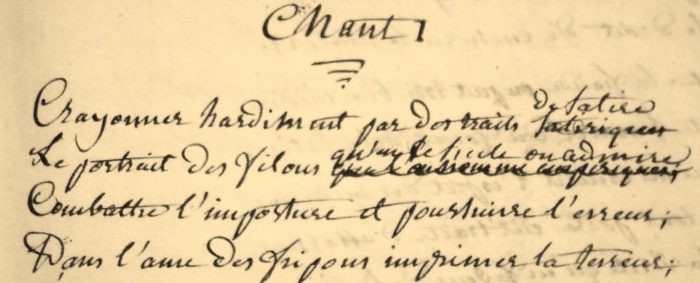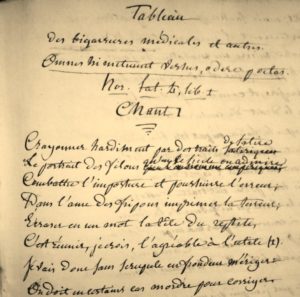[Antoine-Joseph-François Robert]. Tableau des bigarrures médicales et autres, ou Coup- d’œil sur le charlatanisme, poème satirique, accompagné de notes et suivi de commentaires ou annotations analogues au sujet. Par Decourtel notaire breton. No place, no date [1829-1831]. unpublished manuscript. In-folio. 2 pp., 116 pp., 4 pp. white, 89 pp. [. Commentaires]. Recent mute binding in full ivory-overed vellum, flat spines, attaches, exposed stitching, uncut (small waterstain, without gravity, on the head of page of Commentaires). Steel blue cardboard box.
The author was a doctor of medicine, former adviser and ordinary doctor of the king, Chief Medical Officer of Langres Hospitals. He wrote Research and critical considerations on animal magnetism. Paris, Baillère, 1824.
On Chart streaks, remarkable unpublished poem 2 566 Alexandrian four songs is a violent satire against the doctors of the end of the restoration, in the spirit of La Mettrie, the last song lambasting the depraved morals of his time. The Commentaires, in the same spirit, are prose. compound between 1827 and 1830, probably under the government Martignac, Robert has probably seen his satire after the revolution of July, Note that since the event occurred in state 1831. Our manuscript is probably a first time to the net, if we follow the notes that the author has written next to the Foreword: “We should not make use of this manuscript: there are other more polished, and therefore preferable“. Effectively, the paper presents erasures, corrections, sometimes collages and additions in the form of loose-leaf glued (6 in Commentaires). We do, however, have found no trace of another manuscript, and to our knowledge, the book remained unpublished.
The poet, grown strong, as evidenced by the numerous references listed at the bottom of pages of notes (Hippocrates, Juvenal, Perse, Tacit, Cicero, Martial, Horace, but Molière, La Mettrie, Regnier, Boileau, Marot, Bayle, etc.), directs his scathing quotes, in elegant style, against “titrated empirical and other. I therefore attack than men who debase art by a profound ignorance or their baseness; but as the class of charlatans is a torrent that flooded a huge area […] my satire becomes the protocol of all countries. […]. He believes it is better to leave everything in nature, this “conservative force “, and it shows extremely distrustful of the new medicine, in the spirit of Gassendi and Molière. He castigates magnetisers “who by an adroit gesture are falling syncope“And fight the”uromantie “, l’acupuncture, “the artificial somnambulism ” (hypnosis), mesmerism, herbalists charlatans, the “arcanistes ” “possessors of secret remedies ” (syrups against syphilitic diseases and irritations in general, elixirs and other pills), the use of the “Thé de Suisse “, leeches, gum arabic, ointments, potash hydrodal, quinine sulphate, piper, clysters, foot baths, etc. He welcomes, however, the appearance of the stethoscope ” recently invented by a good philanthropist “, even if he is not convinced by its systematic use. But above all,, he condemns the venality of doctors, source of all evils: avarice, social ambition, greed, vanity; and he disapproves of the “begging for practices ” (medical canvassing) as well as complacent prescriptions. He’s attacking these young and new doctors, jealous and envious, very presumptuous, often ignorant or at least uneducated, and calls their theses ” tasteless and fadsy-filled speeches “; he even gives them, repeatedly and at length, on several tasty pages, the recipes to reach, like Tartuffe, Diafoirus, Sganarelle or Knock. “As well, to be happy in hyppocratic art, / And above all to have a huge practice, / Be a chameleon, weirder, bold, / Parasite, ignorant, talkative, ambitious ; / Try to become the youngest of the ladies ; / Like a clever reptile, crawl at women’s feet […] “. Robert also denounces the ignoble lubricity of some practitioners, young and old (pp. 73-78)
On the other hand, he says he wants to reform the status of medical examiners, he opposes patents and their high cost, he advocates tougher and tougher laws on medical practice and morals in general.
Moreover, we note his attack against the booksellers, printers, literary critics and “scribblers which Paris abounds ” (see note p. 108, the criticism of the “Funeral of Louis XVIII”, poem by Victor Hugo published in the Odes et Ballades).
Finally, note a Molière worthy consultation stage (pp. 69-70), the relationship ofa scam mounted by a clergyman “uromante” (p. 70 from Commentaires), quackeries of the hawkers, claiming to have cured an epileptic by pretending to remove a large reddish worm from his head, sell all their ash-based drugs (pp. 11-13 from Commentaires), and the case of a naïve young country girl with a very rebellious chronic metritis, “which had only been caused by masturbation, practiced by a health officer who persuaded the patient that this act was necessary to promote the appearance of the menstruation” (flying sheet stuck between the pp. 68 and 69 from Commentaires).
Remarkable interest document, in a simple binding, pure and elegant.
2 500 €

